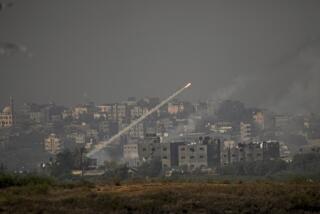PERSPECTIVE ON THE GULF CRISIS : ‘Victory’ Will Reap a Whirlwind : It has all the elements of a Western, but with or without a shooting war, Middle East chaos is the likely outcome.
- Share via
In the classic Western movie, normal life in a peaceful town--the opening scene--is interrupted by the ominous arrival of a clearly identified villain. Outrages accumulate. Initially reluctant, but ultimately forced to fight, the hero confronts the villain in a swift gun battle, and although sometimes wounded, inevitably he triumphs--as the West eventually would in war with Iraq--and the world is again in order.
There are appealing parallels here--a villainous outlaw, a line in the sand, a looming showdown. But whether or not we go to war, the ending almost certainly won’t bring order in the Middle East.
A voluntary Iraqi withdrawal would leave behind a looted and unstable Kuwait. Hundreds of thousands of Kuwaitis have fled while Iraqis have moved in. The Kuwaitis who stayed have suffered. Some have risked their lives protecting foreigners hiding in their midst or participating in other acts of resistance. Some have collaborated with the Iraqis.
Iraq would retain its overwhelming military power and remain a continuing threat to all the gulf states. Mission accomplished, the allies would depart, but most likely the Americans would have to remain as insurance against renewed Iraqi aggression.
If it comes to war, driving the Iraqis out with military force would increase the destruction in Kuwait, as a consequence of both military operations and Iraq’s threatened scorched-earth tactics and reprisals against the Kuwaiti population.
Saddam Hussein might survive a war, still in control, bloodied but unbowed. Deprived of the conventional military means of realizing his ambitions, he could instead embark on a campaign of subversion, sabotage, and terrorism. Or the war might bring about his downfall. If Iraqi politics before Hussein are any guide, that will not lead to a stable pro-Western regime in Baghdad. Iraqi generals might shoot it out among themselves until a new strongman emerges. Or the country might degenerate into another Lebanon.
It is possible that a war to liberate Kuwait would escalate into a war to destroy the Hussein regime completely, which in turn could lead eventually to an allied or American occupation of Iraq confronting a resentful population and potential resistance. Think of the terrorism that confronted the French in Algeria, the British in Northern Ireland, the Israelis in Lebanon or the Soviets in Afghanistan. We might take Baghdad in several months, only to spend the next several years trying to find a way out.
Or a defeated Iraq might become prey for the territorial ambitions of its neighbors, with Iran, Syria and Turkey slicing off the pieces they want while the Kurds, who have been victims of frightful Iraqi oppression, declare their independence.
None of these scenarios--Hussein surviving, Hussein overthrown, Iraq occupied, Iraq partitioned--promises regional stability.
As for Saudi Arabia, the assembly of the allied forces is already a source of tension in that country. It is not certain that the Saudis would be successful in isolating their traditional society from the destabilizing external influences of a continued American presence.
By refusing to side clearly with the allies arrayed against Iraq, Jordan’s King Hussein has lost the trust of political friends and his financial patrons in the Middle East. A war might spread to Jordan. Even if it does not, King Hussein would still have to contend with the domestic strife that a war would produce. Although a skilled survivor, he is in a more precarious position than ever.
The defeat of Iraq would leave the Palestinians with nowhere to go. Yasser Arafat’s renunciation of terrorism in return for diplomatic recognition and support produced nothing. Iraq’s military might will have failed to deliver them a homeland. Israel, even if it is not drawn into war, may be in no mood to offer concessions. Disappointed and desperate, Palestinians may choose the only weapon left--continued terrorism.
A war would also be a source of continuing resentment throughout the Arab world. Americans would be targets for years to come.
In the movies, the hero, his duty done, gets the girl and rides off into the sunset. The townsfolk can again walk the streets safely. That is not the likely ending to the current confrontation. Whether we go to war or not, instability, the need for a continuing American military presence, resentful populations and terrorist campaigns are the more likely sequel.
More to Read
Sign up for Essential California
The most important California stories and recommendations in your inbox every morning.
You may occasionally receive promotional content from the Los Angeles Times.













